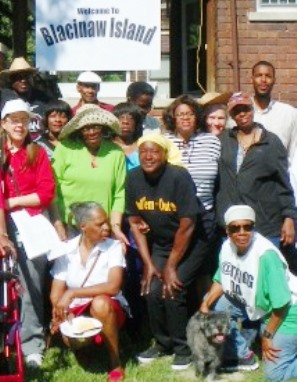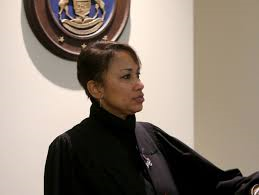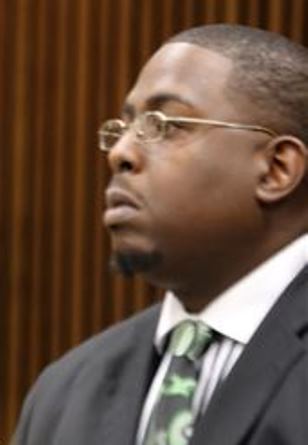Prosecution adds two felony murder charges
Judge bases decision on some evidence not presented in open court
Threat Management expert opinion
Campaign for end to tax foreclosures continues
By Diane Bukowski
January 12, 2015
DETROIT – Shocking many courtroom observers, 36th District Court Judge Ruth Carter bound over 22-year-old Alonzo Long, Jr. for trial Jan. 6, not only on two counts of first-degree murder in the Nov. 28, 2014 deaths of Howard L. Franklin, 72, and his daughter Catherine Franklin, 37, but also on two new counts of felony murder, added that day by the prosecution.
The “felony” involved was larceny, according to Asst. Wayne County Pros. Daniel Williams. He claimed Long and his relatives were stealing blinds and chandeliers from the property they had lost to tax foreclosure, which the elder Franklin had purchased effective Nov. 10. The property belonged to the grandparents of the occupant, and the Franklins had not gone to 36th District Court to evict him. His relatives were helping him move out when events escalated to their tragic conclusion.

Agnes Hitchcock center with yellow scarf, and a few of her many supporters, at Blackinaw Island picnic May 31, 2014,
Howard L. Franklin had a long history of home ownership at various Detroit addresses, along with a number of property foreclosures, listed with the Wayne County Register of Deeds. (Click on History of Howard L Franklin properties to see list.)
“I am extremely disappointed that the young man was bound over on the initial charges,” community organizer Agnes Hitchcock said. “Adding the other charges was a bit much. I plan to attend as many future trial hearings as possible. There are a lot of dynamics here, including all the foreclosures happening in Detroit, the issue of home invasion by the Franklins before they had gone through the lawful eviction process, gun possession by all parties, and the senior vs. youth divide.”
Long’s family called out, “We love you, Junior” as he was led away in handcuffs by court guards. His attorney Charles Longstreet II told VOD, “This was just one side; you are about to see the other side [at trial].” Long was to be arraigned on the information Jan. 13 at Wayne County Third Judicial Circuit Court.
“This is a sad case all around,” Judge Carter said. “The Medical Examiner’s report shows that Howard Franklin was shot seven times, including through the eye, and Catherine Franklin had a through and through gunshot wound in her left arm, and one in her cheek, probably showing that she put her hand up to defend herself. It is not a requirement to figure out who shot first.”
The report was only stipulated to at the beginning of the preliminary exam, which took place over three days. No details other than cause and manner of death were presented. Judge Carter, with the consent of both defense and prosecution, viewed a two-and-one-half hour videotape of a statement Long gave to the police after the killings, in camera. It was not shown in open court.
The prosecution presented no forensics or ballistics reports on the killings. Employees of the younger Franklin testified that both Franklins were armed, and that the younger Franklin fell out of the front door with her gun in her hand, mortally wounded, a circumstance which could have explained why her arm may have been raised. A second employee testified that he saw Howard Franklin with a gun in hand and saw “somebody get loud with Howard and put their hands on him.” A young woman on the premises helping with the move was also shot but survived.
Carter said one employee testified that Long, who was sitting outside in a car when the confrontation began inside, got out with his gun unholstered. VOD heard that employee say that he saw Long with a gun held downwards as the two brushed by each other in the doorway as the employee ran out after guns were produced inside. In the written report presented by police earlier, Long said his gun was holstered when he responded to a relative’s call to “Go get Junior.”
“I do find it interesting that both victims were shot with all kill shots,” Carter said. “The father was shot in the eye, jaw and neck. His gun was found inside his jacket. He told the occupants, ‘C’mon, let’s do this tomorrow.’ I find there is a question of fact and bind the defendant over on the charges.”
Prosecutor Williams said during his argument prior to Judge Carter’s decision that the issue of self-defense cannot be argued at a preliminary exam, but only at a jury trial. that He said the issue of who fired first was crucial, and noted that Long said in his statement that he first saw the elder Franklin with his gun and fired at him first, but did not see the younger Franklin with a gun in the beginning.
“Did he [Long] have time to check about and deliberate?” Williams asked, trying to establish grounds for premeditation. “He had a concealed pistol license, and when you get CPL training, they tell you not to pull out your gun unless you’re going to kill. He goes in, hailed by his uncle inside to assist his uncle in finishing the argument in some way. Ms. Franklin was shot once in the head and once in the arm. Howard Franklin was shot seven times . . . . that left time to contemplate what he was doing. He didn’t say, ‘This is too heated, let’s leave.’ He walked in and shot two people nine times.”
Williams noted later that someone inside said “he’s got a gun,” prior to Long’s entry.
During his argument, defense attorney Longstreet asked the judge to reduce all the charges to involuntary manslaughter. He said there was no evidence of premeditation, or evil intent, necessary for first-degree murder charges, and no “reckless, unwarranted conduct” necessary for second-degree murder charges. He also argued against the felony murder charges, saying that Long did not participate in the alleged taking of property in the house or in the initial confrontation, during which he was outside in the car.
He said an employee had testified that he heard two separate guns firing, indicating that a gunfight had transpired. He mentioned the question of the eviction process without going into detail, and did not challenge the new owner’s right to be on occupied property without going to 36th District Court.
VOD consulted with Dale Brown, an instructor at Detroit’s Threat Management Center, about the various arguments, after being unable to locate any applicable laws. The Center teaches self-defense from a non-violent standpoint, using instructors trained to deal with guns, and well-versed in related legal issues.
“His [Long’s] pulling out his gun does not mean that he had an intent to kill,” Brown said. “Police officers pull out their guns all day and don’t shoot everyone they pull a gun on. Legally, the new owners should not have been in the home at all until the owner/occupant left the premises; that made them home invaders. The police should have advised them that the prior occupant has a right to stay until he is legally evicted or decides to leave.” [VOD had informed Brown that testimony showed that police came to the scene early that day with the Franklins, and negotiated a deal to give the occupants more time to leave.]
“If the new owners left and returned,” Brown said, “they should have knocked and asked permission to enter. The new owners should never have brought guns to that situation; they committed a felony when they did.”
He said it was not legal for the Franklins to pull their guns because someone “put their hands” on them, and that when they did show their guns, the others should have left and called 911, and Long also should have done so when he was called to the house.
“Violence is not the answer,” Brown said. “Here you had two guns vs. one and they still lost. A gun is only a tool; it is your mind that makes the decisions.”
Anti-foreclosure activists including those from the Moratorium NOW! Coalition, have called for an immediate halt to the current chaotic tax foreclosure process which leads to such situations. Neither the Wayne County Treasurer nor the Register of Deeds appears to be advising auctioned homebuyers of their legal obligations, or even telling them if the properties are occupied.
As VOD reported earlier, police officers in a separate incident Dec. 9 handled it properly, with no violence or bloodshed resulting. When the new owner, Jamal Gilmer, confronted the foreclosed owner, Sareena Patterson, with his deed from the tax auction, she pulled out her own deed. Police on the scene then advised Gilmer to leave and take the matter up in 36th District Court. When he refused to do so, police arrested him.
Related:
Detroit Threat Management Center website: http://www.threatmanagementcenter.com/home.html
Previous VOD stories on this case:











GOD HELP DETROIT.
God help that young man
No, God help my family. That was my uncle and cousin that was killed…